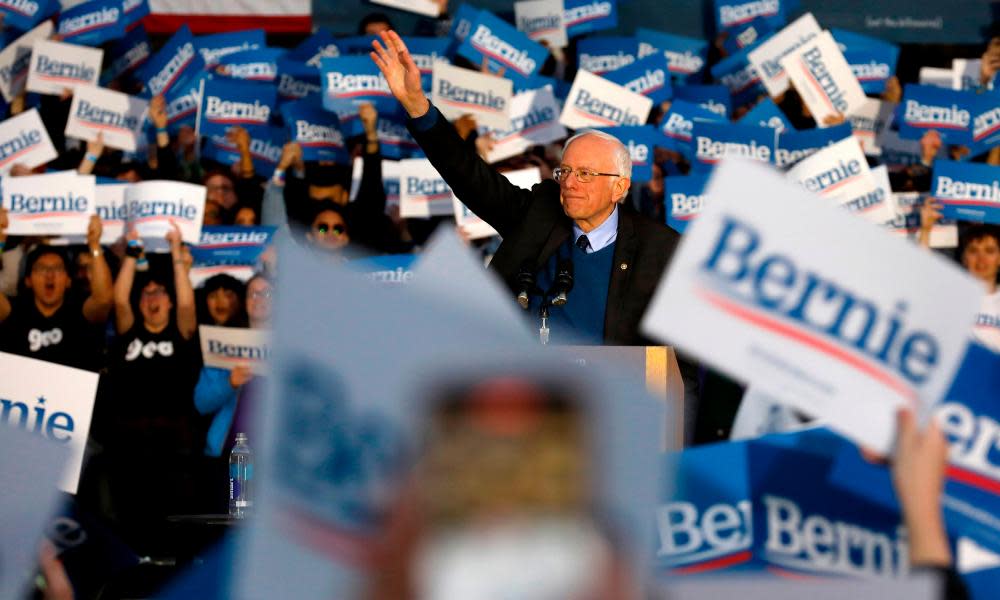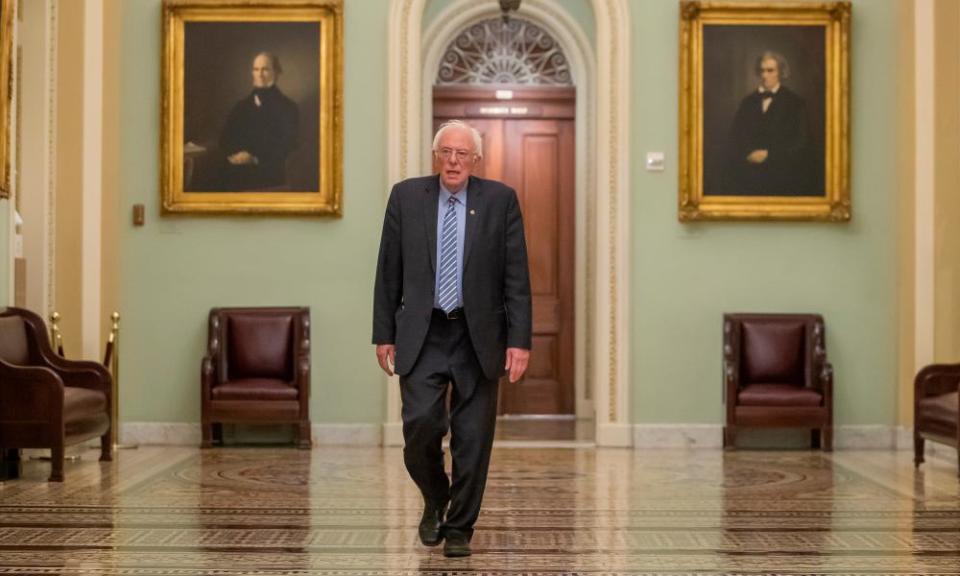Bernie Sanders' campaign still 'assessing' but focusing on a more pressing issue: coronavirus

Bernie Sanders is not done running for president and he’s tired of saying so.
Related: The US presidential election is frozen in time – can it survive?
“For the fourth time,” Sanders said tartly in an interview on The View this week, “we are assessing the campaign.”
It was a response – more diplomatic if no less irritated than previous versions – to a variation on a question he’s been getting for weeks: “Why are you still in the race?”
Sanders has faced calls to drop out since early last month, when Joe Biden began his all-but unstoppable ascent to the nomination. But with the race for the nomination effectively in a state of suspended animation amid the coronavirus pandemic, the 78-year-old Vermont senator has resisted.
Covid-19 has ravaged the US economy and strained the healthcare system, claiming more than 7,000 lives and nearly 10 million jobs. The twin economic and public health crises give what Sanders and allies have described as a new imperative to his calls for universal healthcare and a wide expansion of the social safety net.
“In many ways, this pandemic has made the case for a lot of the policies that the senator has spent 35 years fighting for,” said Anna Bahr, a spokeswoman for the Sanders campaign. “Reality has endorsed Bernie Sanders.”
Since stepping off the physical campaign trail, Sanders has turned his focus almost entirely to the coronavirus pandemic, a crisis he said is on the “scale of a major war”. In glitchy media interviews from his home in Vermont, the senator has argued that the US would be better prepared – and more resilient – in the face of a future pandemic if his policy agenda were already in place.
But his continued presence in the race has alarmed many Democrats, haunted by the fallout from a divisive primary four years ago they believe contributed to Hillary Clinton’s defeat by Donald Trump. Sanders, they contend, had a year to make the case for his political revolution and should now bow out and help unify the party.
“It’s a fantasy to say there is some path for Bernie Sanders to win this nomination,” Jay Jacobs, chairman of the New York party. “If he stays in this race, Bernie Sanders is doing it for one reason and one reason alone and unfortunately it’s for Bernie Sanders.”

‘Enough debates’
Sanders has sent conflicting signals.
On the one hand, he has acknowledged Biden’s daunting lead. Yet he insists there is a path to the nomination, albeit a “narrow” one.
After a dismal showing last month, the campaign deactivated its digital ads while pausing spending on TV ads. Days later, the campaign announced it was ramping up digital organizing ahead of the New York primary, the most delegate-rich contest left New York has since postponed from 28 April to 23 June.
Sanders recently said he would welcome a debate in April, an idea Biden dismissed.
“We’ve had enough debates,” the former vice-president said.
Sanders’ allies are split. Some have said it’s time to exit while others believe he should continue to compete. On Saturday, the Washington Post reported that a group of top aides, including his campaign manager, had encouraged Sanders to withdraw. But many supporters believe the senator should continue collecting delegates, which will serve as leverage to shape the party platform at the national convention.
“Campaigns are an important way to maintain that fight and raise public consciousness on those issues,” Sanders said on NBC’s Late Night with Seth Meyers on Tuesday. “So that’s, I think, one of the arguments for going forward.”
Biden has largely avoided pressuring Sanders, well aware he will need support in the fall if he is the nominee. But he’s not waiting for Sanders either. In recent weeks, Biden has begun making overtures to progressives and young voters. In a fundraising call on Friday night, Biden revealed that he had spoken to Sanders about his search for a running mate.
“He’s a friend,” Biden said. “I don’t want him to think I’m being presumptuous but you have to start now deciding who you’re going to have background checks done on as potential vice-presidential candidates and it takes time.”
Like Biden, Sanders has been sharply critical of Trump’s handling of the coronavirus outbreak. But they diverge on how they would harness the federal government to respond to a future pandemic.
“Our healthcare is without equal in the developed world in being dysfunctional and unfair and expensive,” said Wendell Potter, former head of communications at Cigna who is now president of Business for Medicare for All. “And I think this experience is going to bring into sharp focus how bad we are in terms of providing healthcare.”
As the crisis deepens, support for a single-payer system has climbed. In a survey this month by Morning Consult, support for Medicare for all rose to 55%, its highest point since June 2019. From February to March, net support for Sanders’ sweeping healthcare proposal nearly doubled from 11 points to 20 points.
Sanders’ advocacy has not moved his rival. Biden was recently pressed on MSNBC to explain why universal healthcare isn’t a better option as millions of Americans stand to lose coverage in the coming months, a shift in the way questions about the sweeping proposal are typically framed.
“Single-payer will not solve that at all,” Biden replied. He said overhauling the US healthcare system would take too long and advocated instead for expanding the Affordable Care Act.
In recent weeks, the Sanders campaign has stopped actively fundraising and instead leveraged its extensive donor list to raise money for charities helping Americans suffering from the outbreak. His team has surveyed supporters for ideas on how Congress can provide economic relief, circulated petitions demanding protective equipment and safety protections for Amazon and Walmart workers, and even adapted its digital organizing app, Bern, to help connect users with resources and aid.
Sanders frequently hosts roundtable discussions. On one occasion he sought to channel a wartime president, Franklin Delano Roosevelt, hosting a fireside chat.
The campaign says it raised more than $4.5m for the charities and more than 14 million people have viewed its livestreams.
Sander has also used his perch in the Senate to influence the debate over the response to the crisis. When three Republican senators objected to a provision in the $2tn rescue package that expanded unemployment insurance, Sanders threatened to block the bill unless they dropped their opposition.
“Oh my God, the universe is collapsing!” he said, mocking their concern that the bill might give some struggling Americans extra financial support in a time of crisis. “Oh my word, will the universe survive?”
The recovery package, the largest ever in American history, passed unanimously.
On Friday, Sanders released a slate of priorities for the next stimulus package that his campaign touted as “the boldest legislation ever written in modern history”.
They include monthly cash payments of $2,000 monthly to all individuals, including undocumented immigrants, a freeze on rent and mortgage payments, hazard pay for essential workers and using Medicare to pay all medical costs incurred during the pandemic.
The plan is almost certainly a nonstarter in a Republican-controlled Senate wary of expanding federal relief beyond what was included in the last package.

‘Unprecedented moment’
It remains unlikely that Sanders can dramatically reshape the Democratic primary. He is almost hopelessly behind Biden in the delegate count and many of the biggest contests left are in states that appear more favorable to the former VP, like Georgia, Ohio and Pennsylvania.
The next test comes on Tuesday, when Wisconsin is scheduled to hold its primary despite calls from Sanders and several legal challenges to postpone it. Sanders will likely need a strong performance in the state to keep alive the already dim prospect of a comeback. A new poll from Marquette Law School found Sanders trailing Biden by nearly 30 points in the battleground state.
Sanders knows he has a decision to make. He is, as he tells every interviewer, “assessing” his options. Fundamentally, he believes the pandemic has changed the calculus.
Is it possible to fall short of his presidential ambitions but succeed in his decades-long battle to remake US society?
“Right now in this unprecedented moment in American history,” Sanders told The View, “I think we need to have a very serious look at how we need to go forward.”

 Yahoo News
Yahoo News 
